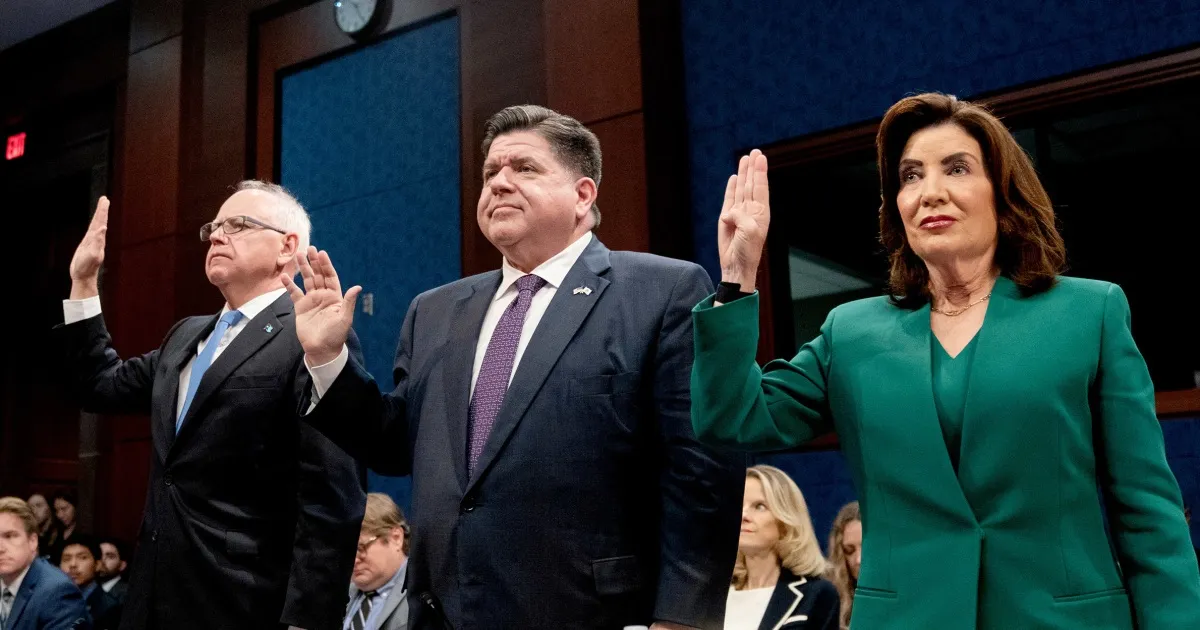
In a heated hearing held on Thursday, House Republicans engaged in a contentious debate with three Democratic governors concerning immigration policies. The session, convened by the House Oversight Committee, served as a crucial platform for discussing sanctuary state policies amid ongoing anti-deportation protests in California and across the nation. Over the course of the hours-long hearing, Republican lawmakers accused Governors Kathy Hochul of New York, JB Pritzker of Illinois, and Tim Walz of Minnesota, of being responsible for crimes committed by undocumented immigrants.
During the hearing, Republican representatives vehemently claimed that the three governors were endangering public safety by supporting sanctuary policies. They argued that these policies contributed to the deaths and abuses committed by immigrants who entered the U.S. illegally. In response, the governors defended their positions, emphasizing that immigration enforcement is a federal responsibility, not a state issue. They suggested that the Republicans were staging a political spectacle designed to appeal to former President Donald Trump.
House Democrats joined the fray, launching direct criticism at Trump. Some lawmakers labeled him a “gangster” or a “dictator,” particularly in light of his deployment of National Guard troops and U.S. Marines to Los Angeles to manage protests against Immigration and Customs Enforcement (ICE) raids. The hearing highlighted deep divisions over immigration enforcement and state cooperation with federal authorities.
The hearing began with a confrontational tone as Rep. James Comer, R-Ky., the committee chair, accused the Democratic leaders of supporting “sanctuary cities and states” that favored illegal immigrants. In a striking counter, Rep. Stephen Lynch, D-Mass., drew a controversial parallel between ICE actions and those of the Nazi German Gestapo. Tensions escalated when Rep. Byron Donalds, R-Fla., questioned Hochul about her alignment with the Biden administration's immigration policies. Hochul responded assertively, highlighting that the federal government was placing undue burdens on state officials.
Despite the heated atmosphere, Governor Walz sought to adopt a more conciliatory approach, reiterating that immigration enforcement is a federal duty. He argued that not cooperating with ICE does not equate to a lack of collaboration. “We have a responsibility to work together,” Walz stated, implying that threats of arrest against elected officials, as suggested by Trump regarding California Governor Gavin Newsom, were counterproductive.
The hearing was not just about immigration; it also appeared to serve as a platform for political ambitions. Rep. Elise Stefanik, R-N.Y., who is contemplating a gubernatorial run in New York, seized the opportunity to criticize Hochul, linking her policies to rising crime rates attributed to undocumented immigrants. “We deserve a governor who stands up for law-abiding New Yorkers,” she asserted, framing her remarks as a campaign message. Other lawmakers present, including Krishnamoorthi, Donalds, and Biggs, are also eyeing higher office.
The hearing also featured numerous attempts by Democrats to document and address the actions taken against them during the protests. Rep. Maxwell Frost, D-Fla., persistently pressed for accountability from Republican leaders regarding the treatment of Senator Alex Padilla, D-Calif., who faced forcible removal while questioning Homeland Security Secretary Kristi Noem. The confrontation led to a brief recess after tensions flared, showcasing the deep divides over immigration and law enforcement policies.
Throughout the hearing, the discussion frequently veered off-topic, with Republicans probing governors about unrelated issues popular with their conservative base. The contentious environment underscored the ongoing debate over immigration enforcement and the responsibilities of state versus federal authorities. As the political landscape continues to evolve, the clash between House Republicans and Democratic governors illustrates the challenges the nation faces in addressing immigration reform amidst rising tensions and differing political agendas.